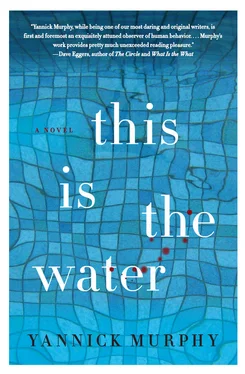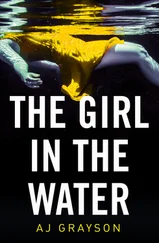Now he’s telling you about Cleo’s race day. How she hit the lane lines on backstroke because, he is sure, the sun was in her eyes. He is looking forward, almost, to the fall season, when the indoor meets will start up again and true backstroke times can be counted. He says that in the middle of the day he finally wised up and bought Cleo some tinted goggles at the facility’s front desk. They helped, but still, Cleo didn’t do as well as she usually does in the back. The front-facing strokes were a different story. Cleo shaved off time in every one of those.
You take a few bites of the pizza. Paul isn’t even eating himself. He is sitting on the end of the other bed. How can we keep from touching each other again? you think. “Can we watch TV?” you say. In a second Paul is grabbing the remote to turn it on.
You don’t have a television at home because where you live there is no service to receive the major stations. You are amazed by how many cuts to commercials there are and how loud they are. The pace of the images and the loud, fast music accompanying them makes you eat more quickly, and before you know it Paul has placed another slice on your plate. You pick up the remote and change the channel. When you find the news, you stop and watch. Kim Hood’s face takes up the screen. They still have no leads, no clues as to who killed her, but they have established through measurements taken of the other victims’ throat wounds that he could be the same man who killed other women at other rest stops around this part of the country. The same state trooper with the battered nose is now being interviewed live. “Yes, that’s right,” he says. “We’ve had a request from Bobby Chantal’s daughter to exhume the body of her mother. If we think it will aid in the investigation, we will certainly comply, but there was a thorough examination of the body at the time of the murder.” The news program then cuts to a beautiful blond-haired woman. It takes you a moment to realize it’s Chris. You are so surprised you can’t say anything, and just watch the TV with your mouth open. The reporter puts the mike in front of Chris, so close to her lips it’s as if she wants her to eat it. “Is it true that your client has agreed to exhuming her mother’s body? How does she feel about that after all these years?”
“First of all, I’m not her lawyer. She’s not my client. I’m just someone who supports her. Exhuming her mother will be emotionally difficult, of course, but she’s prepared to go forward and do that if it means putting a stop to the murders. The examination, twenty-eight years ago, can’t be considered a thorough one by today’s standards, not when scientific testing has advanced so much. Take for instance DNA testing, which wasn’t even used in criminal investigations back—”
Paul grabs the remote and shuts off the television. “I can’t believe this. What does she think she’s doing? Who does she think she is?” He’s standing now, staring at you, waiting for some kind of an answer, when there’s a knock at the door. Paul doesn’t even look as though he’s heard it. The knock comes again. It doesn’t sound like one of your girls knocking. If your girls were on the other side of the door, they would knock about thirty times in a row and kick the bottom of the door and call out your name, or call you a name even, and demand to be let inside the room. This was an adult knock. “I’ll get it,” you say.
Dinah doesn’t wait to be asked in. She marches into the room, taking everything in — the condition of the beds, the pizza on the desk, the clothes that are still on the backs of you and Paul.
“Well, what do we have here?” she asks. “A romantic dinner for two? I came by to let you know a bunch of us other swim parents on the floor are ordering in from the nearby Chinese place, but I can see you two have already taken care of your needs.”
“Get out, Dinah,” Paul says, and as he does, he pushes her backward out of the room.
“Hey, hey, didn’t mean to interrupt your wild night with Thomas’s wife!” Dinah yells, but you can hear she’s not yelling it into the room at you or Paul. She is yelling it so that it carries up and down the hotel floor, so that all of the other swim-team parents can hear. You stand up to leave.
“I’d better go,” you say.
“No. No, please don’t go. I need you,” Paul says. You play back in your head what Paul just said. They are words Thomas has never spoken to you. He may have told you he needed you for something utilitarian — to help stack the wood, for example — but he has never told you he needed you for anything emotional. Then again, you have never asked Thomas for anything emotional either. When you received the phone call telling you your brother had shot himself, and you stood leaning over the counter, feeling as if your legs would not hold you up any longer, and you started to cry, it was the dog who came to you first, whining beside you, wanting to jump up and lick your face, to see what was the matter. Thomas stood off to the side and watched you, and later that night when you questioned aloud why your brother had done it, why he had shot himself, Thomas told you it was because he was an asshole, and there was no need to waste any more energy discussing it. “Why is he an asshole?” you asked Thomas, and he answered that anyone who leaves three kids without a father is a jerk. You wondered if Thomas was right about your brother being an asshole. You didn’t sleep that night, crying intermittently while Thomas slept beside you. You were surprised that grief could cause such insomnia. In the past it had always been worries or anticipation that had made you stay awake.
Now, in this hotel room, Paul is reaching out to you. “It’s all right, I’m not going anywhere,” you say, taking him in your arms as you rub his back and stroke his hair. You stay that way until he leads you to the bed, and still in bed you hold him, and you can hear his breathing in your ear. It is sending up the hairs on the back of your neck, and you want him to start kissing you again. You feel ashamed by the desire. The man is obviously devastated. He has just seen his wife on television declaring that she is intent on getting involved in the biggest drama of his entire life, one that he has been trying to keep secret for so many years.
“What if they connect me to the murder?” he whispers in your ear.
“They won’t,” you say. “They can’t. They don’t have your DNA on file. It’s not like you’re a criminal with a record.”
“I can’t believe this is happening. Maybe it wouldn’t have happened if I hadn’t started spending all that time working in my office on a story about the whole thing. Maybe in a way writing those words down put it out there again, as if the killer himself sensed the words were written and it prompted him to strike again.”
This is you thinking how sometimes you feel as if you’re living in a world not where things aren’t what they seem, but where things are real that you never knew were real, and every day you’re discovering something new — like the possibility of the mere writing down of words making something happen. Even the idea your younger daughter had that the image of a murderer could still be seen on the victim’s eyelids seemed possible to you. Maybe when they exhume the body they should pull back what’s left of Bobby Chantal’s eyelids and see if the image of the killer is still there.
This is you going back into your hotel room after a little while because it’s getting late and your girls need to go to bed and Cleo needs to go to bed. These are the girls all under the covers of one bed watching a movie in the dark and asking for just five more minutes and this is you saying, “No, tomorrow’s a big day. Off to bed.”
Читать дальше












